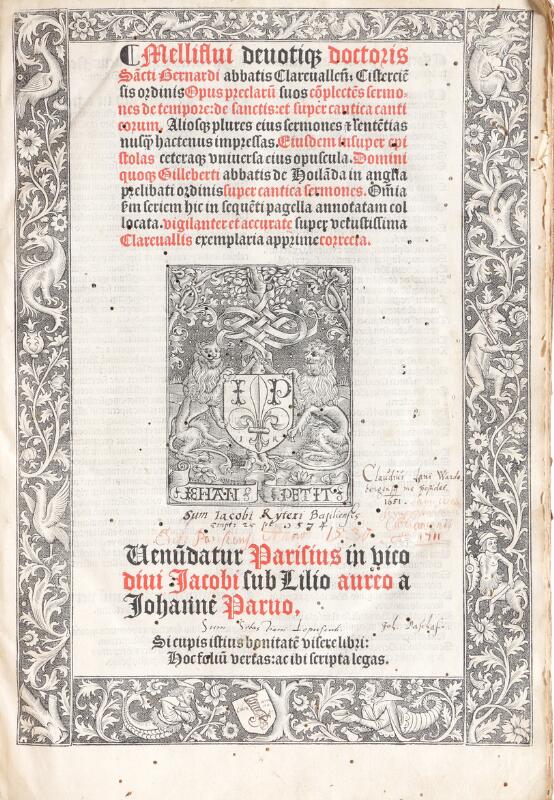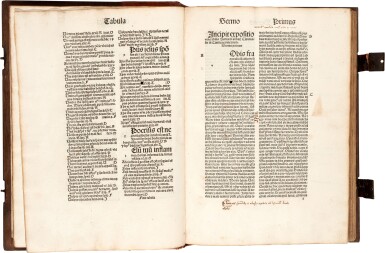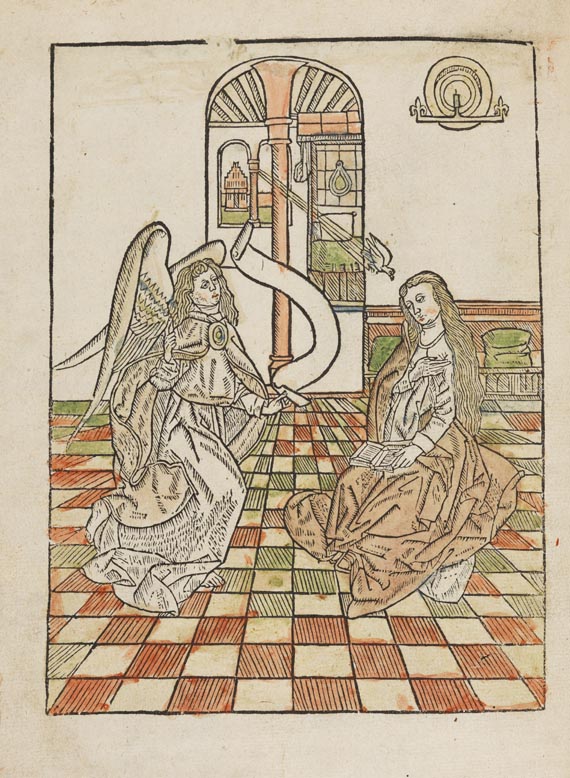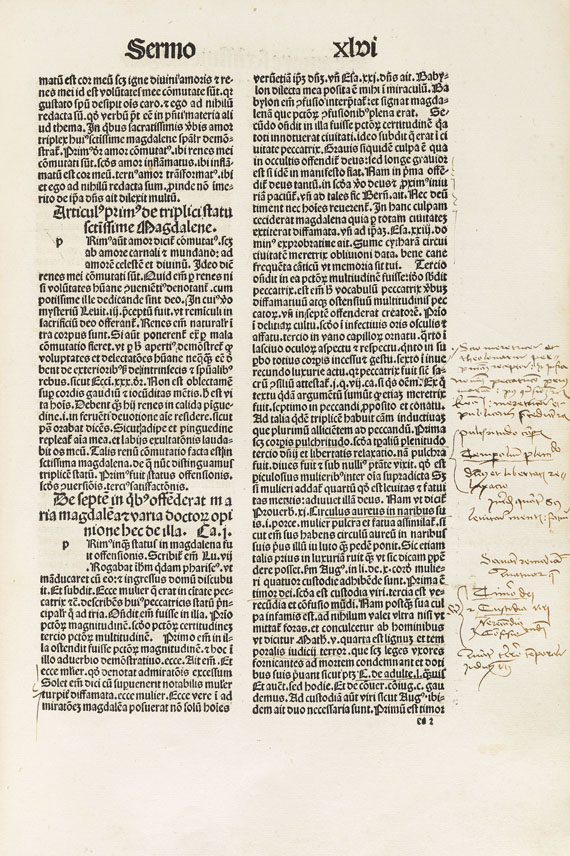Bernard of Clairvaux (Saint, 1090 or 1091-1153). Opus egregiu[m] divi Bernardi super Cantica Canticoru[m] Salomonis : tam co[n]templative q[uam] active vite cultorib[us] precipue vero p[rae]dicatoribus accommodatissimum feliciter incipit. Multa diligentia castigatum ac emendatum per Magistru[m] Johannem Rouauld sacre theologie doctorem, Paris: [Georg Wolf], 24 November 1494, 121 (of 122) unnumbered leaves, a-o8, p10, lacking the final blank p10, gothic black letter type in double column, 54 lines per folio, neat mid-17th-century marginal annotations in brown ink to many leaves (with occasional underlining), scored-through ownership inscription at head of a2, small wormhole to outer blank margin of first two gatherings, title repaired and relaid (some repairs partly affecting title text), a few faint spots to margins, endpapers renewed, modern limp vellum, 4to in 8's (leaf size 22 x 14.5 cm) (Quantity: 1) Goff B-429; Rhodes 324; Copinger 962; GW 3936; Hain-Copinger 2858; ISTC (RLIN) ib00429000; Pellechet 2097. A new edition edited by Jean Rouauld of Bernard of Clairvaux's Sermons on the Song of Songs. Bernard of Clairvaux (1090-1153), known as the 'honey-tongued doctor', was the dominant theological personality of the first half of the twelfth century. As abbot of the Cistercian monastery of Clairvaux, which he founded, he was heavily involved in the political, religious, and philosophical issues of his time, including the expansion of the Cistercian order through the establishment of monasteries, and the adjudication of the papal schism in 1130. In his Sermons on the Song of Songs, one of the most important texts of the Bible for early medieval monastic commentary, Bernard integrates the traditional allegorical method of scriptural exegesis with the Cistercian ethos, giving a profound and insightful reading of the text and its imagery. 'Expressed in the text are emotions of desire together with images and language of a sexual disposition. Modern scholarship has tended to see the Song of Songs as a celebration of human physical love. It may seem surprising that such a text became a favoured subject of ascetic and monastic exegesis, but the fact remains that a long line of Christian theologians interpreted the Song of Songs as a hymn of spiritual, mystical love'. (Neil M. Mancor, Tradition in Bernard of Clairvaux's Sermons On The Song of Songs, University of Reading, online).
Bernard of Clairvaux (Saint, 1090 or 1091-1153). Opus egregiu[m] divi Bernardi super Cantica Canticoru[m] Salomonis : tam co[n]templative q[uam] active vite cultorib[us] precipue vero p[rae]dicatoribus accommodatissimum feliciter incipit. Multa diligentia castigatum ac emendatum per Magistru[m] Johannem Rouauld sacre theologie doctorem, Paris: [Georg Wolf], 24 November 1494, 121 (of 122) unnumbered leaves, a-o8, p10, lacking the final blank p10, gothic black letter type in double column, 54 lines per folio, neat mid-17th-century marginal annotations in brown ink to many leaves (with occasional underlining), scored-through ownership inscription at head of a2, small wormhole to outer blank margin of first two gatherings, title repaired and relaid (some repairs partly affecting title text), a few faint spots to margins, endpapers renewed, modern limp vellum, 4to in 8's (leaf size 22 x 14.5 cm) (Quantity: 1) Goff B-429; Rhodes 324; Copinger 962; GW 3936; Hain-Copinger 2858; ISTC (RLIN) ib00429000; Pellechet 2097. A new edition edited by Jean Rouauld of Bernard of Clairvaux's Sermons on the Song of Songs. Bernard of Clairvaux (1090-1153), known as the 'honey-tongued doctor', was the dominant theological personality of the first half of the twelfth century. As abbot of the Cistercian monastery of Clairvaux, which he founded, he was heavily involved in the political, religious, and philosophical issues of his time, including the expansion of the Cistercian order through the establishment of monasteries, and the adjudication of the papal schism in 1130. In his Sermons on the Song of Songs, one of the most important texts of the Bible for early medieval monastic commentary, Bernard integrates the traditional allegorical method of scriptural exegesis with the Cistercian ethos, giving a profound and insightful reading of the text and its imagery. 'Expressed in the text are emotions of desire together with images and language of a sexual disposition. Modern scholarship has tended to see the Song of Songs as a celebration of human physical love. It may seem surprising that such a text became a favoured subject of ascetic and monastic exegesis, but the fact remains that a long line of Christian theologians interpreted the Song of Songs as a hymn of spiritual, mystical love'. (Neil M. Mancor, Tradition in Bernard of Clairvaux's Sermons On The Song of Songs, University of Reading, online).
.jpg)
.jpg)













Testen Sie LotSearch und seine Premium-Features 7 Tage - ohne Kosten!
Lassen Sie sich automatisch über neue Objekte in kommenden Auktionen benachrichtigen.
Suchauftrag anlegen